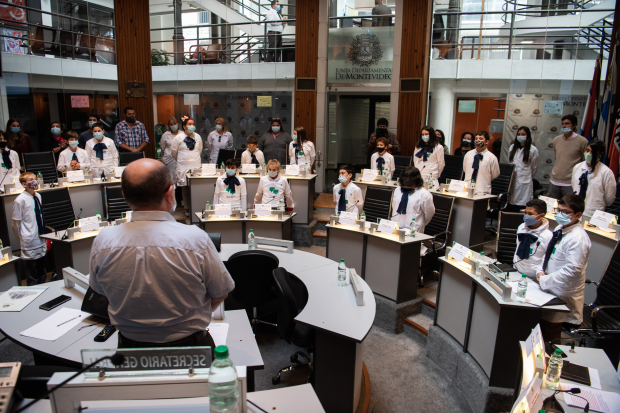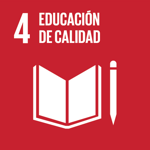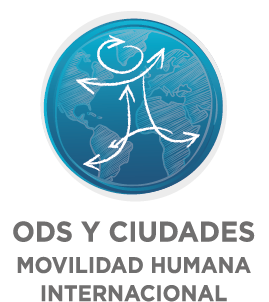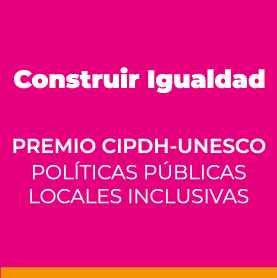
- Region
- Latin America and the Caribbean
- Range of Demographic Size
- 1,000,000 inhabitants or more (metropolis)

4.1 By 2030, ensure that all girls and boys complete free, equitable and quality primary and secondary education which must be free, equitable and of quality and leading to relevant and effective learning outcomes.
4.2 By 2030, ensure that all girls and boys have access to quality early childhood development, care and pre-primary education so that they are ready for primary education.
4.3 By 2030, ensure equal access for all women and men to affordable and quality technical, vocational and tertiary education, including university.
4.4 By 2030, substantially increase the number of youth and adults who have relevant skills, including technical and professional skills, to access employment, decent jobs and entrepreneurship.
4.5 By 2030, eliminate gender disparities in education and ensure equal access to all levels of education and vocational training for the vulnerable, including persons with disabilities, indigenous peoples and children in vulnerable situations.
4.6 By 2030, ensure that all youth and at least a substantial proportion of adults, both men and women, achieve literacy and numeracy.
4.7 By 2030, ensure that all learners acquire the knowledge and skills needed to promote sustainable development, including, among others, through education for sustainable development and sustainable lifestyles, human rights, gender equality, promotion of a culture of peace and non-violence, global citizenship and appreciation of cultural diversity and of culture’s contribution to sustainable development, among other means.
4.a Build and upgrade education facilities that are child, disability and gender sensitive and provide safe, non-violent, inclusive and effective learning environments for all.
4.b By 2020, substantially expand globally the number of scholarships available to developing countries, in particular least developed countries, small island developing States and African countries, for enrolment in higher education, including vocational training and information and communications technology, technical, engineering and scientific programmes, in developed countries and other developing countries.
4.c By 2030, substantially increase the supply of qualified teachers, including through international cooperation for teacher training in developing countries, especially least developed countries and small island developing States.
Convention on the Rights of the Child (CRC).
Universal Declaration of Human Rights (UDHR).
International Covenant on Economic, Social and Cultural Rights (ICESCR).
Summary
The Secretariat of Citizen Education, dependent on the Social Policy Division of the Department of Social Development, aims at offering continuity to proposals on human rights, citizenship-building, and child and adolescent participation.
The Council for Children is a project developed by the Secretariat of Citizen Education of the Municipality of Montevideo, whose goal is the inclusion of the city’s boys and girls in spaces of citizen participation, thus promoting dialogues where everyone’s voices are considered. This effort is the result of a reframing of the Parliament for Children and Adolescents project, implemented by the secretariat since 2016, with four different editions, from a survey carried out in 2019 by the Faculty of Social Sciences under the title “Analysis of the Article 12 Project: Parliament for Children and Adolescents.”
In 2020 (the year when the national health emergency was declared because of the COVID-19 pandemic), a pilot project for distance education for citizens developed in schools and a lyceum was launched, which offered focalized support in educational centers for the vulnerable population of Montevideo.
The project proposed has a flexible working methodology, which should adapt to the realities of each institution and educational group, attending to the needs, demands, and emergences of children and adolescents, as well as the feedback reports submitted by educational staff.
In 2022, based on this background, a new proposal was put forth for the on-site implementation of at least two Councils for Children at the local level: one in Municipal District G and another in Municipal District A. Thus, these municipal districts shall work jointly with the Departmental Government for the development of this brand-new proposal.
Implementation Date:
Start: 05 / 1 / 2020
End: End: Currently in force
- Email: rosa.quintana@imm.gub.uy
- Web: https://montevideo.gub.uy/institucional/dependencias/secretaria-de-educacion-para-la-ciudadania
- Telephone: +598 1950, ext. 8652 / 8653
- Social Network:
Instrumentos

4.1 By 2030, ensure that all girls and boys complete free, equitable and quality primary and secondary education which must be free, equitable and of quality and leading to relevant and effective learning outcomes.
4.2 By 2030, ensure that all girls and boys have access to quality early childhood development, care and pre-primary education so that they are ready for primary education.
4.3 By 2030, ensure equal access for all women and men to affordable and quality technical, vocational and tertiary education, including university.
4.4 By 2030, substantially increase the number of youth and adults who have relevant skills, including technical and professional skills, to access employment, decent jobs and entrepreneurship.
4.5 By 2030, eliminate gender disparities in education and ensure equal access to all levels of education and vocational training for the vulnerable, including persons with disabilities, indigenous peoples and children in vulnerable situations.
4.6 By 2030, ensure that all youth and at least a substantial proportion of adults, both men and women, achieve literacy and numeracy.
4.7 By 2030, ensure that all learners acquire the knowledge and skills needed to promote sustainable development, including, among others, through education for sustainable development and sustainable lifestyles, human rights, gender equality, promotion of a culture of peace and non-violence, global citizenship and appreciation of cultural diversity and of culture’s contribution to sustainable development, among other means.
4.a Build and upgrade education facilities that are child, disability and gender sensitive and provide safe, non-violent, inclusive and effective learning environments for all.
4.b By 2020, substantially expand globally the number of scholarships available to developing countries, in particular least developed countries, small island developing States and African countries, for enrolment in higher education, including vocational training and information and communications technology, technical, engineering and scientific programmes, in developed countries and other developing countries.
4.c By 2030, substantially increase the supply of qualified teachers, including through international cooperation for teacher training in developing countries, especially least developed countries and small island developing States.
Convention on the Rights of the Child (CRC).
Universal Declaration of Human Rights (UDHR).
International Covenant on Economic, Social and Cultural Rights (ICESCR).
Location
- Region
- Latin America and the Caribbean
- Range of Demographic Size
- 1,000,000 inhabitants or more (metropolis)
Contact details
- Email: rosa.quintana@imm.gub.uy
- Web: https://montevideo.gub.uy/institucional/dependencias/secretaria-de-educacion-para-la-ciudadania
- Telephone: +598 1950, ext. 8652 / 8653
- Social network:



